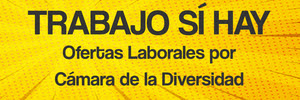LA FURIA TRAVESTI SE TOMÓ LA
FERIA DEL LIBRO DE BOGOTÁ FILBo
OrgulloLGBT.co acompañó el conversatorio y registró en redes sociales este importante evento que dio visibilidad a las personas transgénero.
Foto por @OrgulloLGBT
El pasado sábado 21 abril de 2018 en sala D del Gran Salón Ecopetrol y en el marco de la 31ª edición de la Filbo Feria del Libro se llevó a cabo un conversatorio sobre la "Furia Travesti" como muro de contención para enfrentar las ofensas de la sociedad a un segmento tradicionalmente segregado y estigmatizado.
La FILBo reúne diversas experiencias de hombres y mujeres trans para hablar sobre la emoción de la furia en sus vidas.
 El convesatorio reunió a personas trans que se han apropiando de las ofensas y con ellas se han abierto espacio mediante el humor como un arma de resistencia para transformar la sociedad y luchar contra la opresión.
El convesatorio reunió a personas trans que se han apropiando de las ofensas y con ellas se han abierto espacio mediante el humor como un arma de resistencia para transformar la sociedad y luchar contra la opresión.
Del conversatorio participaron personas visibles de la población transgénero como La señorita María, (De la de la película de su mismo nombre); la bióloga Brigitte Baptiste, el artista y comunicador Nico Bigotín, la ex candidata al Senado Tatiana Piñeros, quienes compartieron sus impresiones sobre el tema con la moderación de Juli Salamanca.
Con lleno completo se desarrolla el conversatorio de #furiatravesti n el marco de la Feria del Libro @FILBogota @CorferiasBogota entre otras : @PeliSrtaMaria @tatianapinerosl @JulianaSalama11 @GiuseppeCaputoC pic.twitter.com/KnXb2pTGaB
— OrgulloLGBT® 45k (@OrgulloLGBT) 21 de abril de 2018
"he pasado de la indignacion a la acción" Conversatorio #FuriaTravesti dice @NicoBigotin al lado de @Brigittelgb @tatianapinerosl hablando de cuál ha sido las reacciones para vencer la discriminación en la lucha por los espacios que les corresponden
— OrgulloLGBT® 45k (@OrgulloLGBT) 21 de abril de 2018
Siempre es bueno encontrar amigos 🌈 Mucha #FuriaTravesti en la @FILBogota con todo el @OrgulloLGBT ❤️ pic.twitter.com/FM3dPdLsZl
— El Perrito Patiño! (@GustavoPerrito) 21 de abril de 2018
Sobre la FILBo
Desde 1988 la Cámara Colombiana del Libro y Corferias, realizan la Feria Internacional del Libro de Bogotá, una alianza exitosa que ha permitido posicionar este evento cultural, como uno de los más importantes en el mundo de habla hispana.
La FILBo fue un proyecto determinante en la designación de Bogotá como Capital Mundial del Libro en 2007 y fue elegida por el Concejo de la ciudad como bien de interés cultural para el país.
Siente las ideas” es el eslogan de la 31ª edición de la Filbo Feria del Libro
Hasta el 2 de mayo estaremos en @CorferiasBogota cubriendo los lanzmientos de libro, autores y eventos LGBT🌈 en la Feria Internacional del Libro de Bogotá @FILBogota #SienteLasIdeas #LeerArgentina+info https://t.co/DSOfHAIy0Y 🏳️🌈Afiliados @CORPRENSACOL pic.twitter.com/ECEw2MKfnE
— OrgulloLGBT® 45k (@OrgulloLGBT) 19 de abril de 2018
Trans-forming rage: Trans community talk about Furia Travesti
By Ángela Forero-Aponte
Hear from five trans voices – including María from Señorita María – as they share their realities, fears, and desire for the whole of society to know who they are, leaving any stereotypes aside.
The trans community in Colombia – transvestites and transsexual people alike – continues to face many problems, including violence and workplace discrimination. This in turn leads to feelings of resentment and rage, some of which came out in a FILBo chat with leading members of the community to talk about the furia travesti.
Nico Bigotin, social communicator and director of Transgarte magazine; Brigitte Baptiste, biologist and director of the Humboldt Institute; Tatiana Piñeros Laverde, public accountant and senatorial candidate in the latest elections; Valerie Herrera, student of the Popular Education Program at Universidad del Valle; and Señorita María, María Luisa Cifuentes as she simply put it in her introduction, shared their views.
The first question posed to the panelists was to explain why the trans community is furious, and how have they lived that rage in their respective fields. By way of introduction, the following quote by Luana Berkin was read: “Physicians and psychoanalysts have described transvestites as men who wear women’s clothing. We reject this definition, which does not explain the ways we think and the ways in which we live. We have decided that one of the first issues we had to focus our efforts on was to give a new meaning to the word ‘transvestite’, which up to now had negative connotations for others and for ourselves. The term transvestite is still being used as a synonym for AIDS carrier; thief; boisterous; infected; marginal. We’ve decided to give new senses to the word, and to involve it in the struggle, in the resistance, in dignity, and happiness.”
Valerie explained that one of the things that makes her furious is the lack of representation of transgender communities in society; she thinks this representation is non-existent in Latin America. Certain people have of course been recognised because they are celebrities, but when she refers to this lack of representation it is the most marginal and impoverished of trans women she is talking about. She considers trans women are still being sold, being prostituted, probably not so much in the streets any more, but when people approach them to film them, to ask them for a picture. The truth is: those trans women who need help are still not receiving it.
Señorita María was asked whether she felt that rage when people insulted her in her hometown in Boyacá. With a loud “we love you” from one the attendees, she admitted she did not feel rage even though people would spit, offend her, step on her, threaten her with a machete or a knife; a devoted catholic, she says whichever offence people might give is an offence to God.
“Señorita María has a very important sanctity vow, but is invoking God’s wrath now,” follows Baptiste jokingly. She says these are big words, that rage does not take us on a good path, but it is impossible not to feel it. “From when we are little we cannot express ourselves the way we would want to (…) and growing up with that rage, with that frustration, that indignation, that personal rage soon transforms into collective rage, which is in solidarity with everybody; this is not only related to gender, this is weaving those relationships, with feminism, with any liberation movement, with all the ‘isms’ (…) we won’t stop protesting against injustice or against people not being accepted or because we are not accepted or because we do not conform to a pattern established ‘up there’, but we are going to trans-form rage.”
Tatiana Piñeros says those who know her know she is not a woman with hatred or rage; “you won’t see me annoyed, that does not go with me.” She admits she does understand those who do not understand transgender people because it is not easy, and it is not common for them to deal with trans people on a daily basis. Tatiana tries to teach them, to let them know trans people are real people, people with dreams, people who cry. To her, that fury turns into a challenge. It is not common to see a trans woman serving pizzas in a restaurant, she says: many spaces have been banned for trans women. “All that drives me to claim those spaces, so that’s furia travesti to me, to claim those spaces, to continue taking up that challenge, facing the fight.”
Nico has lived the furia in different ways; in the beginning – he reflects – it is difficult to understand the attitudes of your friends and family; then there are the times when the voices of trans people are silenced or infantilised. “When you are not used to these types of exclusion, you create a sort of reaction, like you’re lost in life. Then, I claimed my voice and I claimed those spaces, and I recognised myself as a political subject.” He has now passed from indignation to action, and even though it might be easier for trans men to go unnoticed, he always introduces himself as one. Why does he do it? – he asks himself – because he has been able to reach those places because he is trans, white and takes good pictures, which helps. Furia travesti for him is “raising one’s voice, without yelling, not to establish you are better, but to point out that that difference makes me as valid as anybody else.”
We are told that 108 LGBT people were killed in Colombia in 2016. The panelists are asked what can be done to avoid that rage transforming into violence.
Tatiana thinks violence cannot be fought with violence. “We need to understand we are all different, and we have all faced a certain level of discrimination in our lives…sexual diversity is taboo in many parts of the world; pedagogical work needs to be done. We need to inform, we need to tell people; those who don’t understand us are afraid, not because they don’t agree with us, but because oftentimes they don’t know how to treat us.” Valerie agrees that pedagogy is important, but that it is also important for trans women – the ones that have been the most violated – to organise themselves, that way pedagogy can happen in different ways; she is a defender of shock therapy – as she calls it – and mentions she and her activist peers at Universidad del Valle confront those mocking, or making fun of trans people.
Brigitte takes a more practical approach and says there is not enough time to go explaining person by person, mainly also because life is not only about gender. They should certainly take a stand regarding murders and rapes, and they need to call for justice: “exert your authority in the individual way you think authority should be exerted, either by going to the police to ask them to help defend the rights of others, or giving talks to the members of the national police” She closes her remark by saying: “Understanding the rage of those who do not understand us is also necessary because they do not know how to express their anger, when probably all they wanted to was to be in our heels.” It’s a moment of levity in a serious discussion, and the audience laughs in an almost embarrassed way.
The renowned biologist says trans people need to be present with whatever it is they are passionate about; in her case it is her work with the environment. She says she carries weight because of who she is as a professional: “We need that space where we are acknowledged for what we are passionate about; whether we are nuclear physicists or biologists, we need to establish that our presence is absolutely legit, whether we have green hair, or blue hair or six horns.”
Tatiana closes this very interesting and at times shocking discussion by saying petitions need to be made to political leaders so that they understand the transgender community faces special situations so that they don’t end up thinking – like some have – that transgender people should be only be offered hairdressing courses. There is no reason they should know the necessities of the community: it is the community who have to participate and let them know about their needs so that trans people are truly included in the government’s development plans.
https://thebogotapost.com



















































0 comentarios :
Publicar un comentario